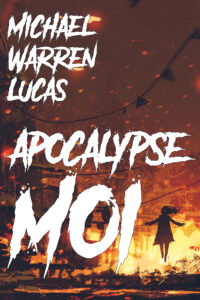This post goes to Patronizers at the beginning of July, and the public at the beginning of August.
Once upon a time, I owned a Chevrolet SSR hard-top convertible. It retailed for fifty thousand dollars in 2005, back when that was real money. No, I didn’t buy it. I won it at a $500/plate charity auction. That I got into for free.
It was a fantastic car. It devoured road. The sound system stunned drivers on the opposite side of the divided highway. Over the fifteen years we owned it, three women and one men ran up to me at stop lights to give me their phone number. Not that I called any of them. Even if I wasn’t happily married, anyone who wanted to hang out with me because I drove an expensive car would find themselves disappointed in every other aspect of my life.
When I had a real job that required my presence on site, I would drive that car one day a week. If I had a day where I ran errands after work and needed to drive extra, I chose that day. Now that I’m directly employed by all y’all I leave the house to go to Costco, my monthly writers’ meeting, the dojo, and BSDCan. Costco is about a four mile trip, maybe once or twice a month. The writer’s meeting, once a month. I drove the convertible to those whenever possible. I had no trouble taking the convertible to the dojo, but I sure wouldn’t let my stinky sticky self back in the car afterwards, so that was a no. Driving it to BSDCan was fun.
Here in Detroit, I could use the car five or six months out of the year. That’s thirteen trips, most of them only a few miles and one over a thousand miles.
I put the car up for sale in 2019, and it sold in January. I was paid in 2020 dollars, sadly. The pandemic hit immediately afterwards, so we put the money in the bank and waited for the next debacle.
This June, our home air conditioning stopped working.
The HVAC mechanic came out and informed us that the system was thirty years old and had been incompetently installed. Hearing that from a service mechanic is an extraordinary claim, and requires extraordinary proof. He provided it, with details like “the interior unit draws power from the electric meter, not the breaker box” and “the reason your bedroom is warm is because rather than put an angle connector in the ductwork, the installer bent it with a hammer.” It’s not that the 1990s coolant this thing used was illegal, but it’s now expensive enough to discourage using it. If we replaced the pipe that blew and recharged the system, one of the others would probably blow.
The lifespan on a modern AC unit? About fifteen years.
How much for a new AC?
Almost exactly what we made selling the convertible.
One of the annoying things about this business is that borrowing money is difficult. The United States runs on credit. I firmly believe in paying cash or doing without, and I don’t mind heat if I can open the windows, but the wildfires get worse each year. I’m not sure if the high particulates give me asthma, or if my lungs are still inflamed from covid, but air conditioning is now mandatory. The HVAC company claims they offer easy financing, but one look at my employer and they’d dial the interest up to “loan shark.” My family needs to pay cash or do without.
I don’t mind living on a cash basis.
I do mind not having options.
We now have air conditioning, and I’ll spend the next year or two replenishing the emergency fund. It’s okay. That’s what emergency funds are for.
And writing is for replenishing that fund.
Run Your Own Mail Server is congealing. The topic requires more up-front explanation than usual, with walking the reader through the basics of forging email and sending spam and exactly why email is a very special trash fire. I keep thinking I’m going to buckle down and pound through these words, but illustrating every step feels like dragging a moose through quicksand and explaining anything requires explaining another topic first. I must disassemble every topic and put the pieces in a meticulous order. That order is achievable, yes, but the reader doesn’t immediately gain anything from that background. I’m pulling every trick I know to make the text pleasant to read, even if the reader doesn’t get the constant slow dopamine hit of technological epiphany. (Some of you will get that hit from the text. You are nerdier than most. Congratulations.)
I took half a day and released a new Prohibition Orcs short story. Yellow-Eyed War is exclusive to my web site for a couple reasons. Yes, disintermediation is one; I prefer people buy direct from me. But it would take me about five hours to upload this tale to every single distribution channel, and I’m not going to make enough on the story to pay that back. So I’m trying exclusivity. We’ll see how well that works. Many of you got this story as part of your Patronizer benefits, so the sales channels is irrelevant.
That leaves the question of what to do with chapbooks, however. (A chapbook is a print edition of a short story or tiny novella.) I put short stories in print to make the ebook versions look inexpensive. (That’s the same reason I offer tech books in hardcover.) I would sell one or two of them to hard-core collectors, but most of the sales were electronic. Of the chapbooks, most of them went to print-level Patronizers.
Additionally, I put stories in print so I can test different fonts, layouts, and other formatting options. I’ll keep designing chapbooks and shipping them to print-level Patronizers, but I suspect that Patronizing is the only way folks will be able to get them. I want to reduce my administrative overhead, and managing yet more stuff in IngramSpark and Amazon’s print program when there’s almost no sales is pure overhead.
Speaking of adding administrative overhead: I seem to be starting the world’s lamest podcast. 60 Seconds of WIP has one guest, me. I read sixty seconds of a current Work-In-Progress, such as RYOMS. It was Allan Jude’s idea, so please direct any blame his way. I got recording and posting each down to less than five minutes, so I’ll probably do one a week for a while and see if anyone cares. This week I’m switching to audio-only, and perhaps sending them into the various podcast distributors instead of just my blog.
Thank you all for your support. I sincerely appreciate it.

